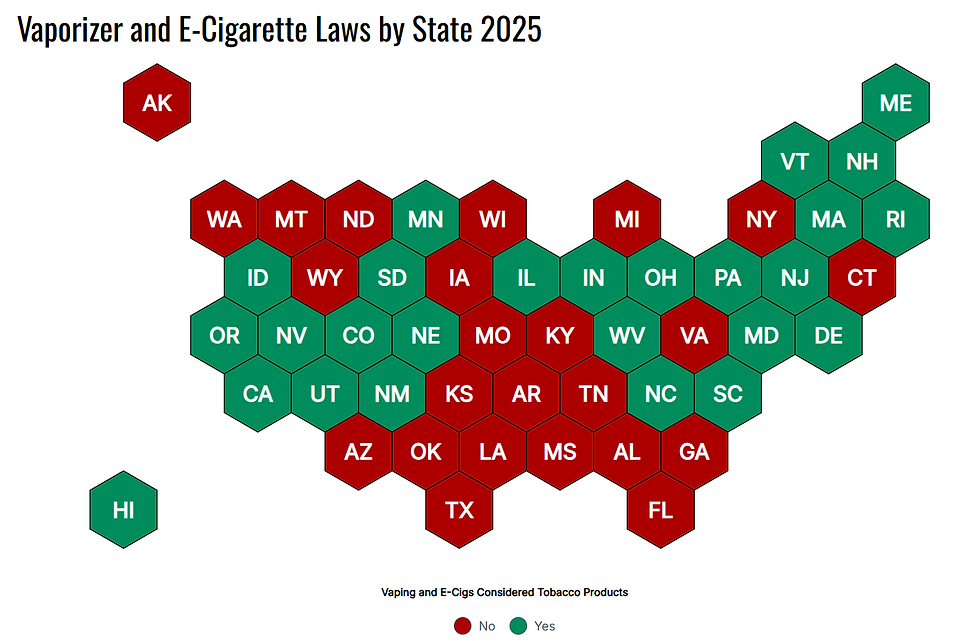Legal Vaping Age: What Are the Consequences for Illegal Teen Vaping?
- chloe053109
- Jul 27, 2025
- 3 min read

What's the Legal Age to Vape?
The Legal Age to Vape in the United States is a minimum range of 18-21. In a few states such as North and South Carolina, Arizona, and Montana, you only have to be 18 to legally use or buy an E-cigarette, but in others such as Texas, New York, Florida, and many more, the minimum age is placed at 21. However, individual states and local jurisdictions have the ability to implement their own regulations that stray from the federal laws.
Why are There Age Restrictions on Vaping?
Age Restrictions are placed on vaping so that the nicotine does not harm the developing mind and bring about addiction at such an early age. The Aerosol from e-cigarettes can contain harmful and potentially harmful substances, including cancer-causing chemicals and particles that can cause damage deep into the lungs. The federal Tobacco 21 act aimed to curb the rising rates of addiction among the youth population by reducing its accessibility to those under the legal age to limit those said damages of vaping.
Common Consequences for Underage Vaping
School Discipline:
Vaping in school, including simply having the vape in your possession, can entail serious consequences. For a first-time offence, your school will likely send you to detention, confiscate the vape, and inform your parents of their findings. The more repeatedly you are discovered with possession/usage of a vape, the more serious your consequences will become. The punishments will then likely range from in/out of school suspensions, to expulsion. However, some school districts have adopted zero-tolerance policies that can mandate placement in a Disciplinary Alternative Education Program, off-campus facilities for students with strong disciplinary struggles, even for a first offense. Overall, your punishment will likely depend on the type of substance in the vape, whether you are dealing them out to others, and how many times you have been caught. For more information about school discipline click here.
Criminal Charges/Fines:
Some punishments minors may also face is fines ranging from $50-250 depending on the severity of what they are caught with. A few others are required community service, suspended drivers licenses, and anti-vaping educational programs. Overall, a minor is unlikely to receive criminal charges, but more of a civil punishment, whilst the dealer caught selling to underage users is at a larger risk of facing criminal charges.
Differences Between Vaping and Smoking Laws
Vaping and smoking are both equally harmful towards your lungs and physical health and heavy usage of them is commonly tethered to addiction. The legal smoking ages and consequences are similar to the age ranges and severity of those for vaping, with the minimum being around 21. Another important thing to be aware of is their classification, with smoking products classified as tobacco, and vaping products (including nicotine-free ones) often regulated as tobacco as well, depending on the state. Below is the map of this classification:

However, even though they have similar classification, some states treat vapes differently from cigarettes (e.g., Arizona allows vaping at 18, while smoking is restricted to 21+).
Smoking laws are more uniform due to long-standing federal and state legislation, whereas vaping laws vary widely by state:
Some states treat vaping like smoking (e.g. California bans vaping wherever smoking is banned)
Others have no statewide vaping restrictions, leaving it up to local governments
Public Use Laws:
Smoking bans are nearly universal in indoor public spaces
Some states include vaping in clean air laws
Others allow vaping in places where smoking is prohibited
Recent Changes in Vaping Legislation
The federal vaping industry is facing a wave of new regulations in 2025, with lawmakers across the U.S. introducing aggressive measures aimed at curbing youth access and tightening product compliance. Many states are banning flavored vaping products, allowing only tobacco or menthol flavors, to reduce youth appeal. States are also requiring vape products to be FDA-authorized or pending review in order to shrink the market which targets smaller companies that can't afford the process.
State-Level Legislation Highlights:
State
Alabama:
Texas:
Washington:
Maine:
North Carolina:
Key Action
Strengthened registry law with new penalties and packaging rules
Possible ban on Chinese made e-liquids
Proposed 95% wholesale tax and flavored vape ban
Bill requiring vape manufacturers to fund vape disposal programs
Passed registry law aligning with Tobacco 21 age restrictions
Closing: As vaping legislation continues to evolve across the U.S., it’s crucial to stay informed about how both federal and state-level laws affect access and enforcement—especially among teens and young adults. The Tobacco 21 initiative and rising public health awareness reflect a nationwide effort to limit underage vaping and its risks. Understanding the legal boundaries and health implications helps us all contribute to a safer environment. Stay updated, stay educated, and share this guide to help others navigate the rapidly shifting landscape of vaping laws. For more information on teen rights and responsibilities, check out my other posts.



Comments